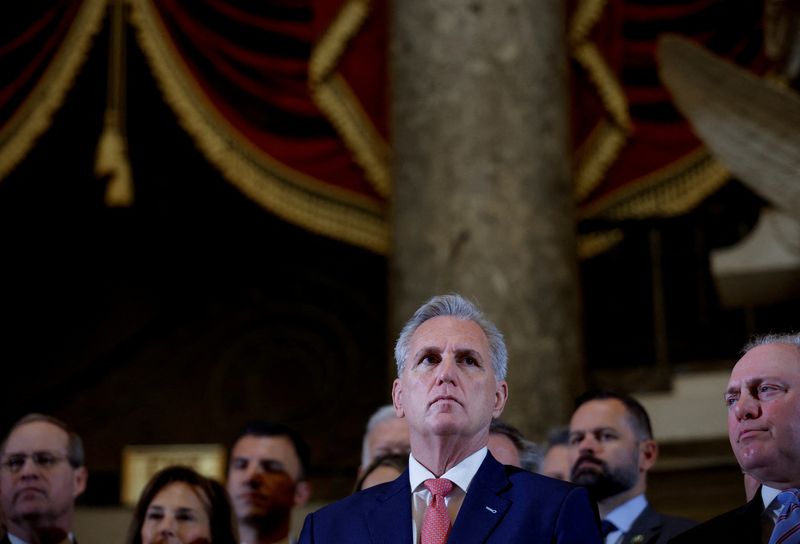
© Reuters. FILE PHOTO: House Speaker Kevin McCarthy (R-CA) hosts a bill enrollment ceremony for legislation blocking the enactment of the Washington, DC City Council’s ‘Revised Criminal Code Act of 2022’, in Statuary Hall in the U.S. Capitol building in Washington,
By David Morgan
WASHINGTON (Reuters) -U.S. House Speaker Kevin McCarthy said on Thursday that Republicans could act on their own to address the federal government’s debt ceiling, after months of demands that President Joe Biden first agree to spending cuts went nowhere.
In the latest sign of growing Republican exasperation over Biden’s refusal to negotiate a deal on spending in exchange for a debt ceiling hike, McCarthy said his party is close to agreeing on a package that could pass the House of Representatives without participation from the president or Democrats in Congress.
“If the president doesn’t act, we will,” McCarthy told reporters at a news conference.
“We have been reasonable, responsible, asked to sit down with the president for months. He has made the decision that he wants to put the economy in jeopardy. I don’t know what more I can do,” the California Republican said.
McCarthy did not say what a Republican-only proposal would look like.
But Republicans in recent weeks have discussed a variety of options they could consider in exchange for a vote to lift the debt ceiling. They have ranged from forcing sharp cuts in spending, to imposing new work requirements on social programs for the poor to new steps to deregulate industry.
Some have also suggested temporarily suspending the debt ceiling to avoid default – a short-term elimination of the limit that avoids default without requiring a specific increase in the $31.4 trillion limit.
Failure to raise, or temporarily suspend, the limit by this summer could lead to a U.S. government default, which would be damaging for the world economy and financial markets that have already been rattled by the collapse of Silicon Valley Bank and Signature Bank (OTC:SBNY), as well as the troubles of Credit Suisse.
The White House showed no sign of budging after McCarthy’s remarks.
“We should not be negotiating on the debt ceiling. We should just not be doing that. The president has been clear,” White House spokesperson Karine Jean-Pierre told a news briefing.
House action on a Republican-only package could be symbolic at best, if the proposal failed to pass the Democratic-controlled Senate.
Congress has the authority to raise the debt ceiling without conditions. Nonpartisan congressional researchers predict that lawmakers have until sometime between early June and September to address the borrowing limit and avert default.
Without offering specific proposals, Republicans have called for clawing back unspent COVID-19 pandemic funds, resetting nondefense discretionary spending to earlier levels and imposing work requirements on social programs that benefit the poor.
Biden has responded by demanding that lawmakers address the borrowing limit first without strings attached. He has also called on House Republicans to produce their own fiscal 2024 budget, which remains weeks – if not months – away.
The president released his own $6.8 trillion 2024 budget on March 9, promising to reduce federal deficits by nearly $3 trillion and extend the life of the Medicare healthcare program for the elderly by raising taxes on the wealthy and corporations.
McCarthy has vowed not to raise taxes and told CNBC this week that Republicans were ready to lay out $4 trillion in spending cuts.
Polling shows Americans support using the debt ceiling talks to address the deficit – but prefer Biden’s path of higher taxes.
Nearly three-quarters of Americans want Republicans and Democrats to reach a deal on the debt ceiling, according to a Reuters/Ipsos poll conducted March 14-20.
Close to 60% of respondents said the debt ceiling provides a good opportunity to push the tough issues of spending cuts or tax hikes.
When asked to choose whether they favored cutting the deficit by raising taxes on the wealthy and on corporations or cutting spending on programs that help the poor and elderly, 69% of respondents to the Reuters/Ipsos poll picked tax hikes, versus 19% who picked the spending cuts. Another 12% said nothing needed to be done.
Majorities of both Democrats and Republicans favored tax hikes.
Representative Kevin Hern, who heads the conservative Republican Study Committee, told reporters that Republicans could accept a debt ceiling deal that includes work requirements on social programs instead of spending cuts as a way to control inflation.
“I think it would be welcomed,” Hern said. “The biggest thing driving inflation today is this number of jobs and number of workers gap being persistently high … Simply holding spending flat is not going to work.”
Source: Investing.com






Discussion about this post